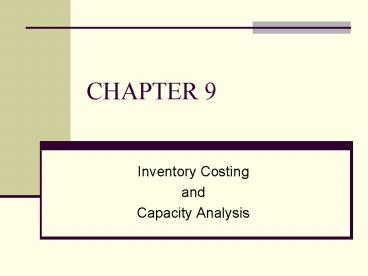Inventory Costing - PowerPoint PPT Presentation
1 / 17
Title:
Inventory Costing
Description:
... of Alternative Inventory Costing Systems. Variable Direct Manufacturing Cost ... to manufacture products to absorb the highest amount of fixed costs, regardless ... – PowerPoint PPT presentation
Number of Views:76
Avg rating:3.0/5.0
Title: Inventory Costing
1
CHAPTER 9
- Inventory Costing
- and
- Capacity Analysis
2
Inventory Costing Choices Summary
- Absorption Costing product costs are
capitalized period costs are expensed - Variable Costing variable product and period
costs are capitalized fixed product and period
costs are expensed - Throughput Costing only Direct Materials are
capitalized all other costs are expensed
3
Comparative Income Statements
4
Costing Comparison
- Variable costing is a method of inventory costing
in which only variable manufacturing costs are
included as inventoriable costs - Absorption costing is a method of inventory
costing in which all variable manufacturing costs
and all fixed manufacturing costs are included as
inventoriable costs
5
Differences in Income
- Operating Income will differ between Absorption
and Variable Costing - The amount of the difference represents the
amount of Fixed Product Costs capitalized as
Inventory under Absorption costing, and expensed
as a period costs under Variable Costing
6
Comparative Income Effects
7
Comparative Income Effects
8
Comparative Income Effects
9
Comparison of Alternative Inventory Costing
Systems
- Variable Direct Manufacturing Cost
10
Comparison of Alternative Inventory Costing
Systems
- Variable Indirect Manufacturing Cost
11
Comparison of Alternative Inventory Costing
Systems
- Fixed Direct Manufacturing Cost
12
Comparison of Alternative Inventory Costing
Systems
- Fixed Indirect Manufacturing Cost
13
Performance Issues and Absorption Costing
- Managers may seek to manipulate income by
producing too many units - Production beyond demand will increase the amount
of inventory on hand - This will result in more fixed costs being
capitalized as inventory - That will leave a smaller amount of fixed costs
to be expensed during the period - Profit increases, and potentially so does a
managers bonus
14
Inventories and Costing Methods
- One way to prevent the unnecessary buildup of
inventory for bonus purposes is to base managers
bonuses on profit calculated using Variable
Costing - Drawback complicated system of producing two
inventory figures one for external reporting
and the other for bonus calculations
15
Other Manipulation Schemes beyond Simple
Overproduction
- Deciding to manufacture products to absorb the
highest amount of fixed costs, regardless of
demand (cherry-picking) - Accepting an order to increase production, even
though another plant in the same firm is better
suited to handle that order - Deferring maintenance
16
Management Countermeasures for Fixed Cost
Manipulation Schemes
- Careful budgeting and inventory planning
- Incorporate an internal carrying charge for
inventory - Change (lengthen) the period used to evaluate
performance - Include nonfinancial as well as financial
variables in the measures to evaluate performance
17
Extreme Variable CostingThroughput Costing
- Throughput costing (super-variable costing) is a
method of inventory costing in which only direct
material costs are included as inventory costs.
All other product costs are treated as operating
expenses































